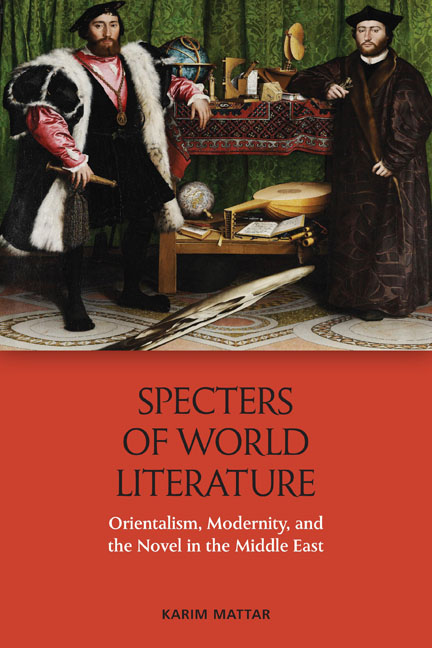Book contents
- Frontmatter
- Contents
- Preface
- Acknowledgments
- Note on Transliterations
- Introduction: Towards a Spectral Theory of World Literature
- I The Worlding of “Literature” in the Middle East
- II The Middle Eastern Novel and the Spectral Life-World of Modernity
- Conclusion: Futures of Spectrality
- Bibliography
- Index
Conclusion: Futures of Spectrality
Published online by Cambridge University Press: 20 October 2020
- Frontmatter
- Contents
- Preface
- Acknowledgments
- Note on Transliterations
- Introduction: Towards a Spectral Theory of World Literature
- I The Worlding of “Literature” in the Middle East
- II The Middle Eastern Novel and the Spectral Life-World of Modernity
- Conclusion: Futures of Spectrality
- Bibliography
- Index
Summary
“Does spectrality have a future?” This question was asked of me by a colleague during an English department conference on “Literature and Environment” at the University of Colorado at Boulder in 2016, at which I presented my Munif material. Knowing my colleague, I at the time took it as an objection to and opportunity to reflect on my reliance on Derrida in light of the declining currency of high theory in the Continental tradition in literary studies. In a somewhat inadequate effort to suggest the opposite, I replied by listing the names of a number of contemporary Derridean literary scholars and discussing some of the ways in which they have been continuing to bring Derridean thought to bear on key issues in world literature, comparative literature, and postcolonial studies in recent years. In this Conclusion, I return to my colleague's question and the implicit repudiation of theory that it marks in a more detailed and systematic way. Such a response, it seems to me, has become all the more urgent in the years since the conference. In this period, a growing momentum appears to have accumulated behind the idea of a “postcritical” turn in literary studies, as articulated and developed by Rita Felski and a few other scholars. Comprising the most comprehensive and potentially revolutionary challenge that theory has faced in the literary academy since its wholesale adoption and institutionalization in the 1980s and 1990s, Felski's call for a sea change in how we do, think about, and teach criticism needs to be addressed in an unrepentantly theory-oriented project such as mine. By engaging with it and the intervention that it attempts here, I lay out some of the wider critical, theoretical, and disciplinary implications of this book.
Felski's book of 2015—The Limits of Critique—represents perhaps the defining statement of what might now be identified as the “postcritique” or “postcritical” school of literary studies. Tapping into anxieties that have previously been voiced by scholars such as Eve Kosofsky Sedgwick, Stephen Best and Sharon Marcus, Lisa Ruddick, and others (in terms of “paranoid reading,” “symptomatic reading,” and so forth), Felski opens with the observation that “critique”—in her view the “dominant metalanguage” of literary studies—is and has always been undergirded by a “hermeneutics of suspicion.”
- Type
- Chapter
- Information
- Specters of World LiteratureOrientalism, Modernity, and the Novel in the Middle East, pp. 300 - 307Publisher: Edinburgh University PressPrint publication year: 2020



